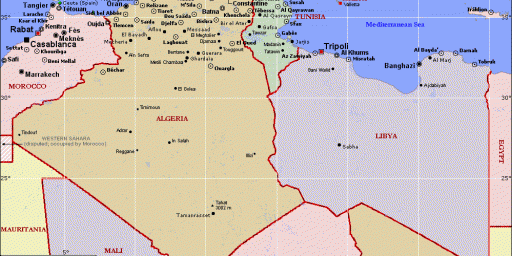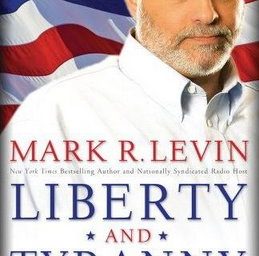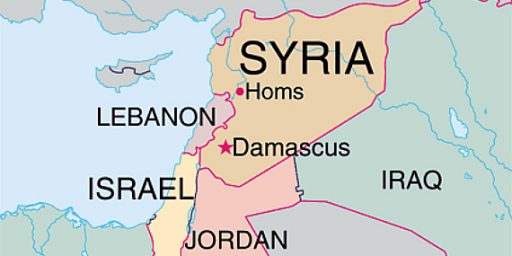U.S. Doubles Nonlethal Aid To Syrian Rebels
The U.S. is sending more aid to the Syrian rebels:
Secretary of State John Kerry on Saturday announced that the U.S. will provide $123 million to Syria’s rebels in additional nonlethal aid that may include armor for the first time.
Kerry made the announcement in Istanbul, Turkey, where he is meeting with Syrian Coalition officials and foreign ministers who back the opposition.
The new aid doubles nonlethal assistance to the rebels, according to the State Department.
(…)
Earlier this week, Sen. Carl Levin (D-Mich.) said President Obama was preparing to ramp up U.S. military pressure in Syria in an attempt to bring the ongoing civil war in the country to an end.
The White House could create a no-fly zone along the Turkish or Jordanian border or additional deployments of Patriot missile systems in those countries.
“Something is happening, something is going on,” Levin said after Wednesday’s Senate hearing on the situation in Syria.
While Obama has not officially requested any recommendations for U.S. military action in Syria, Defense Secretary Chuck Hagel “had a long conversation with the president” on the issue at the White House on Tuesday, according to Levin, who chairs the Senate Armed Services Committee.
Keep an eye on this one. The last thing we need to do is get involved in this civil war.





I’m not sure it’s possible to be as pure and uninvolved as we’re trying to be in Syria. What form will the aid take? How will it be distributed?
If it’s in the form of money, money is, after all, fungible. How do we know the money won’t be spent on arms?
If it’s in the form of goods and the goods are distributed by organizations or individuals over whom we have little control, how do we know the goods won’t be sold and the money used to buy arms or traded for arms?
I think the actual alternatives we have are between having little control over the situation and the outcome or having no control over the situation and outcome. Right now we’re electing the latter.
@Dave Schuler: if it is food, medicine, temporary shelter and things like that, it frees up any money the rebels would have spent on those things, so they can buy guns.
We’re giving them guns, just indirectly.
Greetings:
A week or so ago, I watched a Progressive (née Public) Broadcasting System “Frontline” program entitled “Syria: Behind the Lines”, or some such. The documentary focused on a Syrian river valley where the Assad-loving Alawites were located on one side and the something-loving Sunni rebels on the other.
One of the things that I noticed in the film and that was unremarked upon by the narrator, was that all the women on the something-loving Sunni side were hijab-ed up while on the Assad-loving Alawite side, many, perhaps most, women were, as the Islamanics like to say, “uncovered”.
So, being a Devil-you-know kind of guy, I’m thinking that this is not going to end all that well. Some more hundreds of millions to help out people who will hate us whether we do or we don’t may well seem like an “investment” to the current administration, but, to me, not so much.
Islam is the millstone. If your plan doesn’t include constraining, undermining, or eradicating Islam, you don’t have a plan. What you have is a hope.
In the end, the idea that we could live in splendid isolation and just wait for the “good guys” to come out on top was naive. Even more naive was the idea that we could just ignore what was happening in a country that borders on Israel ( special ally), Turkey (NATO alley) , Lebanon, Saudi Arabia, Jordan, and Iraq-all allies to a certain extent.
For there to be any chance that the good guys will come out on top, we are going to have to provide more aid to the good guys. And it is in our national interest to devote at least some effort into making the good guys come out on top. Just how much effort is what we will have to debate.
Ah, but who are the good guys? Are there good guys?
In the end, the idea that we could live in splendid isolation and just wait for the “good guys” to come out on top was naive. Even more naive was the idea that we could just ignore what was happening in a country that borders on Israel ( special ally), Turkey (NATO alley) , Lebanon, Saudi Arabia, Jordan, and Iraq-all allies to a certain extent.
For there to be any chance that the good guys will come out on top, we are going to have to provide more aid to the good guys. And it is in our national interest to devote at least some effort into making the good guys come out on top. Just how much effort is what we will have to debate.